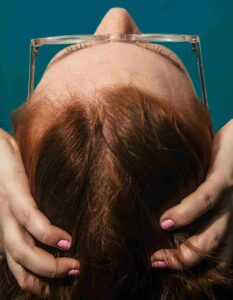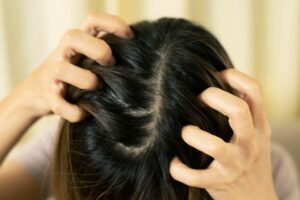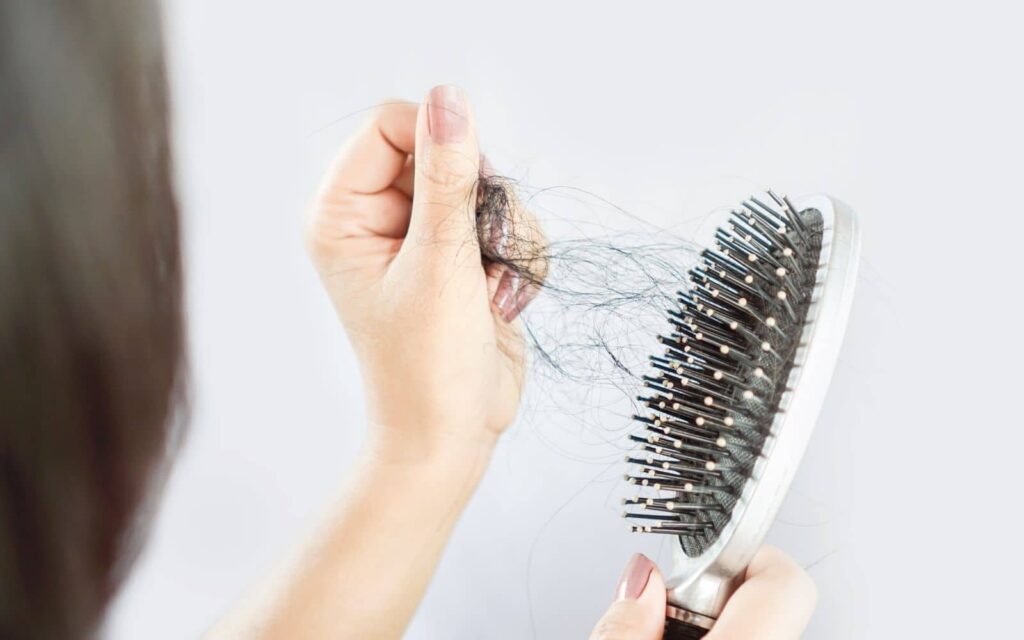As women enter the transitional phase of perimenopause, they often encounter a myriad of changes in their bodies. One commonly overlooked aspect is hair health, as hormonal fluctuations can lead to increased hair shedding and thinning. In this blog, we’ll explore the causes and provide effective perimenopause hair loss treatment options to help you regain control and confidence during this natural life stage.
Contents
Why Perimenopause Causes Hair Loss?
 The primary hormones affected during perimenopause are estrogen and progesterone. And their declining levels contribute to hair loss through several mechanisms:
The primary hormones affected during perimenopause are estrogen and progesterone. And their declining levels contribute to hair loss through several mechanisms:
- Hormonal Imbalance: Estrogen is known to promote hair growth and maintain hair health. As the levels of estrogen decrease during perimenopause, it can disrupt the natural hair growth cycle. And, leading to increased hair shedding and thinning.
- Effect on Hair Follicles: Estrogen helps to keep hair in the anagen (growth) phase of the hair cycle for a longer duration. With decreasing estrogen levels, more hair follicles enter the telogen (resting) phase prematurely, resulting in a higher number of hairs falling out.
- Sensitivity to Androgens: As estrogen declines, the relative proportion of androgens (male hormones, such as testosterone) may increase. Some women may have a genetic predisposition to be more sensitive to androgens.
- Thinning of Hair Strands: Reduced estrogen levels can also impact the diameter of individual hair strands. Hair may become finer and more prone to breakage, contributing to an overall perception of thinner hair.
- Impact of Stress: Perimenopause is often accompanied by increased stress levels, which can further exacerbate hair loss. Stress hormones, such as cortisol, may contribute to a condition called telogen effluvium, where more hair follicles than usual enter the resting phase and subsequently shed.
- Nutritional Deficiencies: Hormonal changes during perimenopause can affect nutrient absorption and utilization. Deficiencies in key vitamins and minerals. Such as iron, vitamin D, and B vitamins, are associated with hair loss.
Understanding the multifaceted factors contributing to perimenopausal hair loss is essential for developing effective strategies to manage and mitigate its effects. Women experiencing significant hair loss during perimenopause are encouraged to consult with healthcare professionals.
What Are Some Perimenopause Hair Loss Treatment Options?
Managing perimenopausal hair loss involves a multi-faceted approach that addresses hormonal changes, nutritional deficiencies, and overall hair health. Here are some perimenopause hair loss treatment options that women may consider:
Hormone Replacement Therapy (HRT)
Hormone replacement therapy involves the administration of estrogen and, in some cases, progesterone to address hormonal imbalances during perimenopause. Estrogen is crucial for maintaining hair health, and HRT can help alleviate the effects of declining estrogen levels. However, the decision to pursue HRT should be made in consultation with a healthcare professional, as it is not suitable for everyone. The potential benefits of managing perimenopausal symptoms, including hair loss, should be carefully weighed against the associated risks.
Topical Minoxidil
Minoxidil is a topical solution that is applied directly to the scalp to stimulate hair growth and prevent further hair loss. While the exact mechanism is not fully understood, it is believed to increase blood flow to the hair follicles and extend the growth phase of the hair cycle. It is available over-the-counter and has shown effectiveness in promoting hair regrowth, especially in the crown and frontal areas. Consistency in application is crucial, and results may become noticeable after several months of regular use.
Prescription Medications
In cases where perimenopausal hair loss is associated with androgenetic alopecia, a hereditary condition influenced by hormones, a healthcare professional may prescribe medications such as finasteride. Finasteride works by inhibiting the action of dihydrotestosterone (DHT), a hormone linked to hair loss. However, it is essential to be aware of potential side effects, and the use of such medications should be closely monitored by a healthcare provider.
Nutritional Supplements
Addressing nutritional deficiencies is vital for promoting overall health and hair growth. Biotin, a B vitamin, is often associated with improved hair and nail health. Iron deficiency can contribute to hair loss, especially in women with anemia. Additionally, vitamin D and other B-complex vitamins play roles in maintaining healthy hair. Before incorporating supplements, it’s crucial to consult with a healthcare professional to determine individual needs and avoid unnecessary risks.
Healthy Diet
Adopting a balanced and nutrient-rich diet is fundamental for overall well-being and can positively impact hair health. A diet rich in fruits, vegetables, lean proteins, and whole grains provides essential vitamins and minerals that support hair growth. Omega-3 fatty acids, found in foods like fish, flaxseeds, and walnuts, are known for their anti-inflammatory properties and can contribute to a healthy scalp. Maintaining proper hydration is also key, as dehydration can negatively affect hair texture and growth.
Scalp Massages
 Regular scalp massages can be a simple yet effective method to improve blood circulation to the hair follicles. By gently massaging the scalp, you stimulate blood flow, bringing essential nutrients to the hair roots and promoting a healthy environment for hair growth. This technique also helps in relaxing the scalp and reducing tension, contributing to an overall sense of well-being. Incorporating scalp massages into your routine, either with or without the use of oils, can be a relaxing and beneficial practice for those experiencing perimenopausal hair loss.
Regular scalp massages can be a simple yet effective method to improve blood circulation to the hair follicles. By gently massaging the scalp, you stimulate blood flow, bringing essential nutrients to the hair roots and promoting a healthy environment for hair growth. This technique also helps in relaxing the scalp and reducing tension, contributing to an overall sense of well-being. Incorporating scalp massages into your routine, either with or without the use of oils, can be a relaxing and beneficial practice for those experiencing perimenopausal hair loss.
Essential Oils
Certain essential oils have been popularly associated with promoting hair health. Oils like lavender, rosemary, and peppermint are believed to have properties that may benefit the scalp and hair. These essential oils can be diluted with a carrier oil, such as coconut or jojoba oil, and gently massaged into the scalp. While some anecdotal evidence suggests positive effects on hair growth and thickness, scientific studies on the efficacy of essential oils for hair loss are limited. It’s essential to perform a patch test before using essential oils and consult with a healthcare professional to ensure safety and effectiveness.
Stress Management
Stress is a known contributor to hair loss, and managing stress levels can positively impact overall well-being, including the health of your hair. Incorporating stress management techniques such as meditation, yoga, deep breathing exercises, or regular exercise can be beneficial. These practices help reduce cortisol levels, a stress hormone that, when elevated over time, can contribute to conditions like telogen effluvium, causing more hair follicles to enter the resting phase and subsequently shed. By prioritizing stress reduction, you create a more supportive environment for hair growth.
Professional Hair Care
Choosing the right hair care products and adopting healthy hair care practices can contribute to maintaining the strength and vitality of your hair. Opt for shampoos and conditioners that are gentle, sulfate-free, and formulated for your specific hair type. Avoid excessive heat styling, as it can lead to hair damage and breakage. Additionally, minimize the use of chemical treatments, such as perms or relaxers, as they can weaken the hair shaft. Regular trims can help prevent split ends and promote healthier-looking hair.
It’s essential to note that the effectiveness of these treatments can vary from person to person. Consulting with healthcare professionals ensures a tailored approach to address individual needs and concerns. Additionally, it’s important to be patient, as positive changes in hair health often take time to manifest.
Does Perimenopause Hair Loss Grow Back?
 Perimenopausal hair loss, in many cases, is a result of hormonal changes and other factors influencing the hair growth cycle. The outlook for regrowth varies from person to person and depends on several factors, including the underlying cause of hair loss, individual health, and the effectiveness of chosen treatments. Here are some considerations:
Perimenopausal hair loss, in many cases, is a result of hormonal changes and other factors influencing the hair growth cycle. The outlook for regrowth varies from person to person and depends on several factors, including the underlying cause of hair loss, individual health, and the effectiveness of chosen treatments. Here are some considerations:
- Hormonal Changes: If perimenopausal hair loss is primarily related to hormonal fluctuations, addressing these imbalances through hormone replacement therapy (HRT) or other treatments may help slow or stop further hair loss. Some women may experience regrowth as hormonal levels stabilize.
- Treatment Response: The effectiveness of treatments such as topical minoxidil, prescription medications, and nutritional supplements can vary among individuals. While some people may experience noticeable regrowth, others may see improvements in the thickness and quality of existing hair.
- Genetic Factors: Genetic predisposition plays a significant role in hair loss. If there is a family history of androgenetic alopecia (hereditary hair loss), the regrowth potential may be influenced by genetics. Treatments can help manage the condition, but they may not fully reverse genetic hair loss.
- Lifestyle Changes: Adopting a healthy lifestyle, including a balanced diet, regular exercise, stress management, and proper hair care, can contribute to overall well-being and create a more favorable environment for hair regrowth.
- Time Frame: Hair growth is a slow process, and noticeable results may take several months. It’s essential to be patient and consistent with chosen treatments. It may be helpful to set realistic expectations regarding the extent and speed of regrowth.
It’s important to note that complete regrowth may not be achievable for everyone. Especially if the hair loss is due to genetic factors. However, with the right combination of perimenopause hair loss treatment and lifestyle adjustments, many women can effectively manage and improve the overall health and appearance of their hair.
Conclusion
In conclusion, perimenopausal hair loss is a common concern for many women, but with a comprehensive and personalized approach, it can be managed effectively. Understanding the hormonal changes, embracing a healthy lifestyle, and exploring various treatment options, from hormone replacement therapy to topical solutions and nutritional supplements, are key steps in addressing this issue. Patience is crucial, as noticeable results may take time.
Consulting with healthcare professionals, such as dermatologists or trichologists, ensures tailored guidance and ongoing support. Hence, remember, you’re not alone in this journey. And by taking proactive steps, you can navigate perimenopausal hair loss with confidence and promote overall well-being. If you are facing menopause related issues, menopause treatment at HerMantra can help. Book your free trial online menopause treatment session now.


